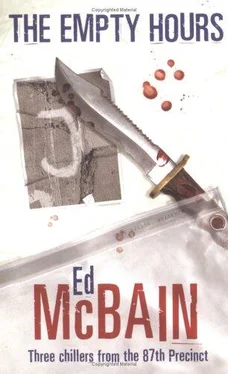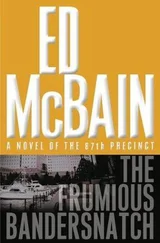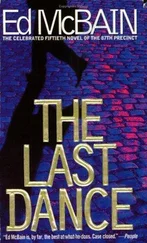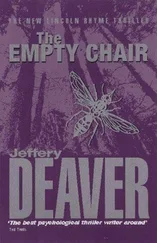“You are really not allowed ...” Kurtz started, but Hawes was already halfway across the room, moving toward the other small area of light where a green-shaded bulb hung over the work bench. The buzzing sound was louder, the sound of an old machine, the sound of ...
He located it almost at once. A grinding wheel was set up on one end of the bench. The wheel was still spinning. He looked at it, nodded and then flicked the switch to turn it off. Turning to Kurtz, he smiled and said, “Were you sharpening something?”
“Yes, those skates,” Kurtz said. He pointed to a pair of white figure skates on the bench.
“Yours?” Hawes asked.
Kurtz smiled. “No. Those are women’s skates.”
“Whose?”
“Well, I don’t think that is any of your business, do you?” Kurtz asked politely.
“I suppose not,” Hawes answered gently, still smiling. “Were you in here sharpening something last night, too, Mr. Kurtz?”
“I beg your pardon?”
“I said, were you ...”
“No, I was not.” Kurtz walked up to the bench and studied Hawes slowly and deliberately. “Who are you?” he asked.
“My name’s Cotton Hawes.”
“How do you do? Mr. Hawes, I’m sorry to have to be so abrupt, but you are really not allowed ...”
“Yes, I know. Only instructors are allowed in here, isn’t that right, Mr. Kurtz?”
“After closing, yes. We sometimes come in to make minor repairs on our skis or ...”
“Or sharpen up some things, huh, Mr. Kurtz?”
“Yes. Like the skates.”
“Yes,” Hawes repeated. “Like the skates. But you weren’t in here last night were you, Mr. Kurtz?”
“No, I was not.”
“Because, you see, I heard what could have been the sound of a file or a rasp or something, and then the sound of this grinding wheel. So you’re sure you weren’t in here sharpening something? Like skates? Or ...” Hawes shrugged. “A ski pole?”
“A ski pole? Why would anyone ... ?” Kurtz fell suddenly silent. He studied Hawes again. “What are you?” he asked. “A policeman?”
“Why? Don’t you like policemen?”
“I had nothing to do with Helga’s death,” Kurtz said immediately.
“No one said you did.”
“You implied it.”
“I implied nothing, Mr. Kurtz.”
“You asked if I were sharpening a ski pole last night. The implication is…”
“But you weren’t.”
“No, I was not!” Kurtz said angrily.
“What were you sharpening last night?”
“Nothing. I was nowhere near this shop last night.”
“Ahh, but you were, Mr. Kurtz. I met you outside, remember? You were coming down the steps. Very fast. Don’t you remember?”
“That was earlier in the evening.”
“But I didn’t say anything about time, Mr. Kurtz. I didn’t ask you when you were in this shop.”
“I was not in this shop! Not at any time!”
“But you just said, ‘That was earlier in the evening.’ Earlier than what, Mr. Kurtz?
Kurtz was silent for a moment. Then he said, “Earlier than ... than whoever was here.”
“You saw someone here?”
“I ... I saw a light burning.”
“When? What time?”
“I don’t remember. I went to the bar after I met you ... and I had a few drinks, and then I went for a walk. That was when I saw the light.”
“Where do you room, Mr. Kurtz?”
“In the main building.”
“Did you see Helga at any time last night?”
“No.”
“Not at any time?”
“No.”
“Then what were you doing upstairs?”
“I came to get Maria’s skates. Those.” He pointed to the figure skates on the bench.
“Maria who?”
“Maria Fiers.”
“Is she a small girl with dark hair?”
“Yes. Do you know her?”
“I think I just saw her in the hallway,” Hawes said. “So you came to get her skates, and then you went for a drink, and then you went for a walk. What time was that?”
“It must have been after midnight.”
“And a light was burning in the ski shop?”
“Yes.”
“But you didn’t see who was in here?”
“No, I did not.”
“How well did you know Helga?”
“Very well. We taught together.”
“How well is very well?”
“We were good friends.”
“How good, Mr. Kurtz?”
“I told you!”
“Were you sleeping with her?”
“How dare you ...”
“Okay, okay.” Hawes pointed to the skates. “These are Maria’s, you said?”
“Yes. She’s an instructor here, too. But she skates well, almost as well as she skis.”
“Are you good friends with her, too, Mr. Kurtz?”
“I am good friends with everyone!” Kurtz said angrily. “I am normally a friendly person.” He paused. “Are you a policeman?”
“Yes. I am.”
“I don’t like policemen,” Kurtz said, his voice low. “I didn’t like them in Vienna, where they wore swastikas on their arms, and I don’t like them here, either. I had nothing to do with Helga’s death.”
“Do you have a key to this shop, Mr. Kurtz?”
“Yes. We all do. We make our own minor repairs. During the day, there are too many people here. At night, we can ...”
“What do you mean by all? The instructors?”
“Yes.”
“I see. Then any of the instructors could have ...”
The scream was a sentient thing which invaded the room suddenly and startlingly. It came from somewhere upstairs, ripping down through the ancient floor boards and the ancient ceiling timbers. It struck the room with its blunt force, and both men looked up toward the ceiling, speechless, waiting. The scream came again. Hawes got to his feet and ran for the door. “Blanche,” hewhispered, and slammed the door behind him.
She was standing in the corridor outside the hall bathroom, not really standing, but leaning limply against the wall, her supporting dancer’s legs robbed of stance, robbed of control. She wore the long flannel nightgown with a robe over it, and she leaned against the wall with her eyes shut tight, her blond hair disarrayed, the scream unvoiced now, but frozen in the set of her face and the trembling openness of her mouth. Hawes came stamping up the steps and turned abruptly right, and stopped stock still when he saw her, an interruption of movement for only a fraction of a second, the turn, the stop, and then a forward motion again which carried him to her in four headlong strides.
“What is it?” he said.
She could not answer. She clung to the wall with the flat palms of her hands, her eyes still squeezed shut tightly, the scream frozen in her throat and blocking articulation. She shook her head.
“Blanche, what is it?”
She shook her head again, and then pulled one hand from the wall, as if afraid that by doing so she would lose her grip and tumble to the floor. The hand rose limply. It did not point, it only indicated, and that in the vaguest manner, as if it too were dazed.
“The bathroom?” he asked.
She nodded. He turned from her. The bathroom door was partly open. He opened it the rest of the way, rushing into the room, and then stopping instantly, as if he had run into a stone wall.
Maria Fiers was inside her clothing and outside of it. The killer had caught her either dressing or undressing, had caught her in what she supposed was privacy, so that one leg was in the trousers of her pajamas and the other lay twisted beneath her body, naked. Her pajama top had ridden up over one delicately curved breast, perhaps as she fell, perhaps as she struggled. Even her hair seemed in a state of uncertain transition, some of it held firmly in place by curlers, the rest hanging in haphazard abandon, the loose curlers scattered on the bathroom floor. The hook latch on the inside of the door had been ripped from the jamb when the door was forced. The water in the sink was still running. The girl lay still and dead in her invaded privacy, partially clothed, partially disrobed, surprise and terror wedded in the death mask of her face. A towel was twisted about her throat. It had been twisted there with tremendous force, biting into the skin with such power that it remained twisted there now, the flesh torn and overlapping it in places, the coarse cloth almost embedded into her neck and throat. Her tongue protruded from her mouth. She was bleeding from her nose where her face had struck the bathroom tile in falling.
Читать дальше












